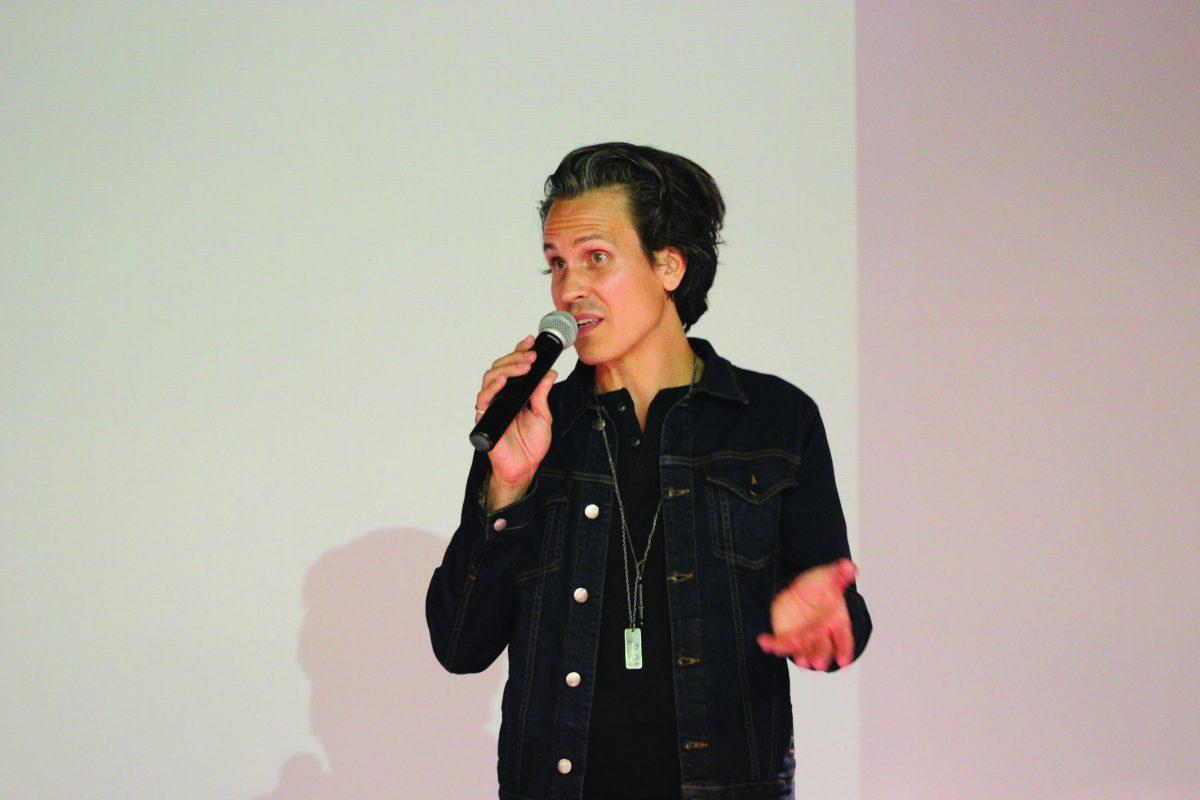Photo by Alexis Cruz
BY KOLTON KNAPP
As the karaoke machine hummed a tune, a 15-year-old girl named June sat at a table wearing a fake smile. Grown men three times her age sat around her, smoking cigars and fondling her without the privacy of closed doors.
David Zach described the young girl’s demeanor as a “resignment to her fate.”
Zach told his audience in the Olmsted Center about being exposed to the realities of child sex trafficking throughout the world. Zach retold his story while traveling with his band on Sept. 27. With the permission and support of his wife, Zach began to work with Exodus Road, a non-profit organization designed to help modern slaves, both sex and labor workers, escape their old lives and begin a new one, according to the organization’s website.
Zach outlined in his speech the story about how he met June at a karaoke club turned brothel in the depths of Thailand on his first undercover initiative in cooperation with Exodus Road. Once Zach understood what sex trafficking was, its existence jarred him. He has since gone to multiple countries to free young girls.With the help of local authorities, he attempts to dismantle the red-light district.
“There is no way to sugar coat it,” Zach said.
Writing songs about the young girls forced into sex trafficking offers Zach a therapeutic method to release the guilt he feels when pondering the lives these young ladies live. He said that listening to his song lyrics “moves something inside,” re-inspiring him to continue his work.
Full of stories about his journey, Zach expressed the fabricated way the sex trafficking industry plays both its employees and its customers.
“It feels fake,” Zach said. The girl’s smile, putting on a facade just to feed their children. “You see a young girl holding a man’s hand, and you think to yourself, ‘This can’t be real.’”
Horrifying videos were shown to the audience, pictures of girls with blurred out faces forced into lineups and made to go with men they didn’t want to go with.
Zach told a story of a young girl who was tricked into sex trafficking. The child thought she was working at a nail salon, until an old man purchased her for the hour.
“I don’t want to go with this man,” she pleaded.
“Come back in 10 days,” the proprietor told the customer. “She’ll be ready for you then.”
Zach said that while some may ignore the problem, the problem does not merely go away.
Other organizations spoke about the realities of sex trafficking in America at the event on Friday. In Iowa, the non-profit relief group Monsoon offers help for targeted Asians who are trying to escape the sex trade.
Sara Brown, a program specialist with Teens Against Human Trafficking, spoke out about middle and high school aged girls being brought into the sex ring.
Brown told the story about how one of her roommates during her modeling career was drawn into this inhumane trade.
“There was eight of us girls living in the same house,” she said.
Eventually, Brown said, one of the young girls found an attractive young man who showed significant interest in her and gave her special treatment.
“We were all jealous of her and wanted to live her life,” Brown said.
Brown said her roommate took trips across the country with her hot young boyfriend, but when she returned home the others could tell that her weekend had been rough.
“Red flags began going up all over the place,” Brown said.
Brown said the other girls started to distance themselves from the young man, and eventually Brown’s roommate disappeared.
She said she received a call from the young woman’s mother four months later and learned the reality of this harrowing situation.
“I lived with her,” Brown said. “I don’t want to ever be in the same room with someone knowing that they were living like that and not being able to do anything about it.”
Encouraging students to be alert for the warning signs of sex trafficking, Brown offered services to anyone in need.
“We can point you in the right direction,” Brown said. “Our job is to make the connections to get you somewhere safe.”
Brown said fundraising is a great way to raise awareness and money to support the fight against sex trafficking in America and abroad.
“Slavery will not end in my lifetime, but what a tragedy if we do not do our best,” Zach said.
Zach argued that individuals, including Drake students, can do something to impact the world.
“We have different fingerprints,” Zach said. “I will continue to use my vocal chords, to speak out about the horrors of sex trafficking.”
Zach left Drake University with a pressing question: “Why are the people so quiet?”







